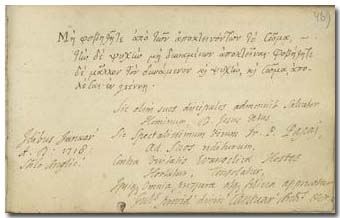

Sic olim suos discipulos admonuit Salvator Hominum, D[ominus] Jesus
Christus.
Sic spectatissimum virum Fr[anciscum] P[ariz] Papaj, ad suos rediturum,
Contra Veritatis Evangelicae Hostes hortatur, consolatur,
Illique Omnia prospera atque felicia apprecatur
Gul[ielmu]s provid[entia] divin[a] Cantuar[iensis]
Arch[iepiscopu]s &er.
Idibus Januar A. D. 1718. Stilo Anglic[o]
|
* Mt 10:28: Vulgate: “et nolite
timere eos qui occidunt corpus animam autem non possunt
occidere sed potius eum timete qui potest et animam et corpus
perdere in gehennam” .
|
|
|
|
And fear not them which kill the body, but are not able to kill
the soul; but rather fear him which is able to destroy both soul
and body in hell. *
Thus had exhorted once his disciples the
Saviour of mankind, the Lord Jesus Christ.
And thus do I exhort and console the illustrious Ferenc Pápai
Páriz who is returning to his beloved ones; and I wish him success
and good fortune in everything in spite of the enemies of the
evangelical truth.
William, by God's grace Archbishop of
Canterbury
On the Idus of January of 1718,
by the English calendar
|
p.
469. [London], January 24, 1719
Wake, William
(1657-1737), English theologian,
Archbishop of Canterbury
William Wake was born on January 26, 1656/57 in
Blandford, Dorset county, the son of the local gentleman William
Wake. After the local school in 1672 he immatriculated in Christ
Church of Oxford, where he graduated M.A. in 1679. In 1682
he went to Paris as a chaplain of the English ambassador Vicomte
Preston, and from then on he was engaged in the cause of the
French Protestant church. In Paris, on commission of the Bishop of
Oxford, he studied the Greek codices of the New Testament. After
his return to England in 1688 he was the pastor of the famous
college of jurists Gray’s Inn in London. He published pamphlets
against the Catholic church. In 1689 he graduated doctor of
theology (D.D.), and was appointed one of the court preachers of
William III (1688-1702) and Queen Mary. From 1689 he was canon of
Christ Church in Oxford, from 1694 pastor of St. James of
Westminster in London, and from February of 1702/03 Archdeacon of
Exeter. In 1705 he became Bishop of Lincoln, and in January
1715/16, after the death of Thomas Tenison (1636-1715), Archbishop
of Canterbury. He died on January 24, 1736/37 in Lambeth's
Palace, the see of the archbishops of Canterbury in London. He was
an erudite and active, liberal and patient personality. He kept
relations with the theologians of the Sorbonne and other French
ecclesiastical personalities who disapproved certain papal
measures. He made efforts for reconciliation and even unity
between different Protestant factions, what is more, between the
French and Anglican church. He left his numismatic collection and
valuable library to Christ Church of Oxford. Some of his
works, besides his sermons and pamphlets: An exposition of the doctrine of the Church
of England … London, 1686. – Of our obligation to put our
trust in God … In a sermon preached before the Honourable
Society of Grayes-Inn, upon the occasion of the death of our late
Royal Sovereign Queen Mary. By William Wake, D.D. Chaplain in
Ordinary to his Majesty, and preacher to the same Society. London,
1695. – A short vindication of the Ld. Archbishop of Canterbury
from the imputation of being the author of a letter lately printed
at Zurich [in a pamphlet entitled Oratio historica de
beneficiis a Deo in Ecclesiam Tigurinam], concerning the state
of religion in England. London, 1719. – Preparation for death,
being a letter sent to a young gentlewomen in France, in a
dangerous distemper, of which she died, Ao 1684. Eighth ed.
London, 1723. – The principles of the Christian religion
explained, in a brief commentary upon the church catechism.
London, 1699. – The doctrine of the Holy Eucharist. In:
Gibson, Edmund: A preservative against Popery …, vol. 10.
London, 1848. – Sure and honest means for the conversion of all
hereticks … translated from the French … London, 1688.
Ferenc Pápai wrote from London on September 25, 1715
to Count Sándor Teleki, without mentioning names, that the old
Archbishop of Canterbury (Thomas
Tenison) did not even understand their cause; and on March 14,
1716 he related that the new Archbishop (William Wake), when
having received them on audience before his promotion, “offered
himself to our service with great benevolence” [Jankovics].
Following the appeal of George I on March 23, 1716, Archbishop
William issued a circular on June 10, inviting the believers in
his archbishoprics to support with their donations the Protestant
churches of the continent in need [Gömöri: Adalékok]. Two and a
half years later, on January 24, 1718/19 he wrote the words of
Jesus in the album of Pápai Páriz: “And fear not them which kill
the body…”, exhorting and consoling the owner of the album in
the middle of the tribulations of his fatherland. – David Wilkins,
Librarian of Lambeth Palace
and later archiepiscopal chaplain wrote in the same day in the
next page of the album (p. 471).
•
DNB • Jöcher • Michaud |

